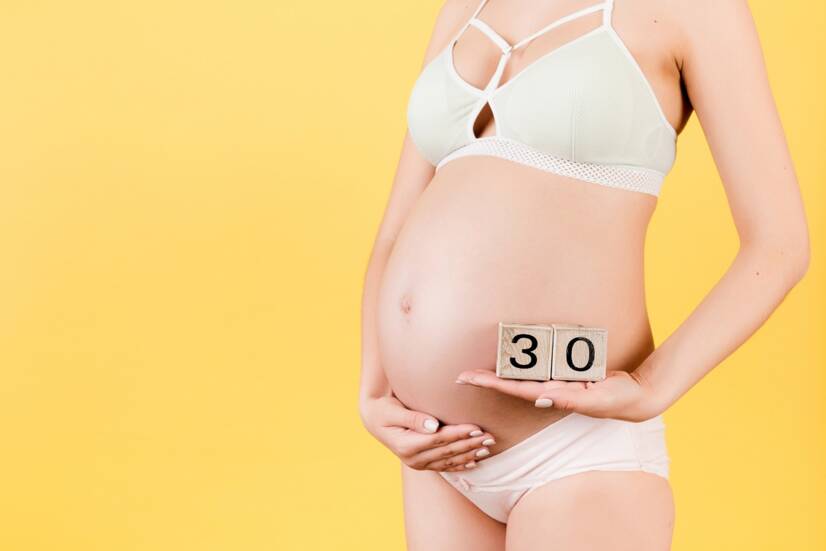- thebump.com - Pregnancy Week by Week
- mayoclinic.org - Pregnancy week by week
- whattoexpect.com - 30Weeks Pregnant
30 weeks pregnant. Getting bigger every day?

The growth of the pregnant belly is still continuing. So is the growth of your baby, who is getting bigger every day.
Article content
The weight you gain in weight now is probably the fetal weight.
These last weeks of pregnancy are very important for the growth and development of a healthy newborn.
How is your baby developing in your tummy?
The weight of the fetus at 30 weeks of pregnancy is approximately 1320 g and its length is 40 cm.
Your baby is growing every day. He may gain up to half a kilo a week.
The baby's weight continues to increase, his muscle and fat tissue develops. His body rounds out and his fat cells fill in.
By the 30th week, your baby is already formed and will only be maturing. It may already be in the womb in a head-in pubic position. If it is already positioned that way, it usually stays that way until the end of labour.
The table shows the approximate measurements of the fetus at 30 weeks, as measured by the sonographer
| Total length | Weight | HC Head circumference | BPD Transverse head diameter | AC Abdominal circumference | FL Femur length |
| 39.9 cm | 1320 g | 278.4 mm | 78.9 mm | 253,8 mm | 55,5 mm |
Read more about fetal size in the article:
Ultrasound in pregnancy: fetal size, what is fetal biometry?
The brain continues to develop and is increasingly striated. However, its development will continue after birth.
Hiccups are common in third trimester babies.
Hiccups 10 weeks before birth stimulate the brain
and play an important role in its development.
The fetus can already open its eyes wide. But its eyesight is still developing. It is already beginning to distinguish what surrounds it, reacting to light even though it spends a lot of time with its eyes closed.
The lungs are developed enough that the baby could breathe on its own outside the womb if it were born. The baby continues to practice breathing movements. By the 30th week, the baby is practicing breathing. Breathing movements are much more frequent, up to 30-40% of the time.
The baby's skin begins to produce melanin, the pigment that gives skin color. But most of the production does not begin until after birth.
Hair growth continues. Hair slowly thickens and body hair slowly disappears.
The baby's hands are fully developed and his fingernails are growing. He tries to grab everything around him with his hands. He grabs his hands, his face, his umbilical cord and his feet.
It is found in approximately 1 litre of amniotic fluid.
The bones are already fully developed but are still soft and flexible. At this time, they are mineralising. The bones are slowly strengthening and preparing to support the fetal body.
Red blood cells begin to form in the bone marrow.
The adrenal glands have produced steroid hormones. Their production doubles in the last weeks. They are responsible for the growth and development of the sex organs.
The baby senses environmental sounds and your voice. After birth, it will recognize you by your voice.
How does a woman feel at 30 weeks?
Your abdomen feels hard and tight at times. Braxton-Hicks contractions, or messengers, are getting stronger and are perfectly normal. This is your body preparing for the upcoming birth.
They often occur after exercise, exertion, fatigue or sex.
If you feel your tummy hardening, sit down or lie on your side if you can. Rest.
If the errands do not stop and occur at least 4 times an hour or more, see your doctor or go to the hospital for a check-up. Doctors will check to see if premature labor is starting.
Are you gaining weight?
Don't worry about it. The extra pounds you have gained will help you breastfeed.
But of course, watch your weight.
It's important to monitor your weight. Watch for sudden weight gain or swelling. Too much weight gain can be a sign of pre-eclampsia. If you notice a big weight jump, tell your doctor.
Preeclampsia requires medical attention.
The breasts begin to show noticeable changes. The veins may become more prominent, the nipples may become larger and darker.
Your colostrum, the first nourishing breast milk, is already in your breasts. It may even leak a little, spilling out. If your milk leaks, we recommend getting breast pads to avoid discomfort and spots around your nipples.
Findingthe right comfortable sleeping position can sometimes be difficult. When you finally find it, you find that you need to go to the toilet again. All it takes is for the baby to change position and push on the bladder. Or you may be woken up by cramps in your legs during sleep at night.
So try to go to bed earlier. Sleep longer if you can. Resting during the day is also good for you.
You may also have trouble sleeping or vivid dreams about giving birth and having a baby. Sometimes frightening. Don't worry, it's the increased hormones and anxiety about the impending birth.
It is recommended to sleep on your left side for proper circulation of blood in your body and put a pillow between your legs. A great help for you during sleep can be a pregnancy pillow to help you take a comfortable position.
Digestive problems, bloating and heartburn is already more obvious. Relaxation in a semi-sitting position is recommended against heartburn.
If you experience headaches and dizziness, try to keep to a drinking regime and rest.
Back pain is common in the third trimester. It gets worse with weight gain. Focus on good posture, limit wearing heels and reach for comfortable shoes instead.
What can you notice?
You get tired faster, walking becomes more difficult.
You may notice that your whole belly is shifting to your sides. The baby is growing and doesn't have enough room, so its movements are more noticeable. Now is a great time to talk with your partner and your belly, your baby, who can feel your voice.
Have you noticed mood swings or started to feel anxious? Nothing unusual. Your body is going through changes - not just hormonal, but an ever-growing belly associated with discomfort and reduced physical function, restricted movement or fear of premature birth. Intermittent and poor quality sleep is also a contributing factor.
Your feet may increase in size.
You may notice darkening of the skin or brown spots on the skin. A brown line from the pubic bone to the navel may begin to appear.
Your skin is oilier and your hair is thicker.
Itchy skin from a tightening belly can also accompany the appearance of stretch marks. Therefore, regular lubrication of the skin is recommended.
Sensitivity and swelling of the gums with subsequent bleeding is also common, especially after brushing your teeth.
Watch out for the development of urinary tract and vaginal infections, to which you are more susceptible in the third trimester.
What examinations are waiting for you in the 30th week?
In this week, in addition to the traditional examination by palpating the size of the uterus and checking the cervix, your doctor will check your blood pressure, pulse and examine your urine for protein, blood, sugar and pus. He or she will also take blood for a blood count. He or she will check whether you are developing anaemia, which is common towards the end of pregnancy.
If a woman has anaemia, the foetus is not being nourished enough and without treatment, premature birth or a hypotrophic foetus (a baby with a low birth weight compared to its age in weeks, its growth development is slowed down) may occur.
The growth of the fetus is checked sonographically to see if it is developing normally or if its growth has slowed down. In this case, a hypotrophic fetus is born.
The doctor carefully checks the position and size of the placenta. The position in which the placenta is located does not change after the 30th week.
He also checks the fetal sounds, its position and the amount of amniotic fluid. He calculates the expected weight by measuring the head, abdomen and femur. He checks the blood flow in the umbilical cord and verifies that the baby is adequately supplied.
It asks you about the baby's movements and the frequency of abdominal hardening. In addition, it records your weight, your weight gain and the size of your uterus. It listens to the regularity and frequency of fetal heartbeats.
If you're expecting twins or multiple babies, your babies have probably gained weight so far, just like other babies in the womb. From weeks 30 to 32, they may slow down in growth.
If you feel pain and hardening in your abdomen, it's a good idea to monitor whether these are messengers or if they are already real contractions. Your doctor will probably recommend a CTG (cardiotocography) to scan for contractions and fetal echoes in your tummy.
What do we recommend?
- Don't forget to get enough calcium every day to support fetal bone strengthening.
- It is recommended to practice Kegel exercises to firm the pelvic floor and speed up healing after birth.
- When anxious, communicate with your partner or other moms to remove your fears about childbirth.
- Start with preparing your birth bag and getting everything you will need ready. Just the feeling of having everything packed and being prepared can help you to remove your fears and anxieties.
- If not, it's time to think about it and decide.
- Light exercise, swimming, walking can help you prepare for birth.
- Don't forget to get plenty of rest and sleep.
- Slowly start getting your baby's first clothes and look for equipment like a cot, car seat.
You may be thinking about whether to breastfeed or formula feed. The decision is, of course, yours. Breast milk is the primary nutrition for a newborn and by breastfeeding you reduce the risk of breast cancer.
Read more about the other weeks of pregnancy in the summary article:
Pregnancyby weeks: How does pregnancy and fetal development work?
Interesting resources
Related










